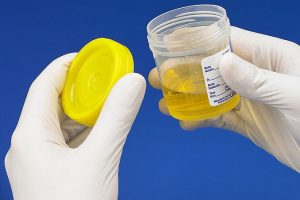Simple Urine Test Could Improve Detection of Bladder Cancer

A simple and cost-effective urine test could improve early detection and management of bladder cancer, according to a brief issued by the International Agency for Research on Cancer (IARC).
This test detects the presence of specific mutations in the promoter of the telomerase reverse transcriptase (TERT) gene in urine samples. Results from two independent clinical studies, one conducted in France, the other in Iran, show “excellent performance” in detecting bladder cancer, the authors comment.
“IARC has developed a droplet digital PCR (ddPCR) assay that detects TERTpm in urine samples (uTERTpm),” said Florence Le Calvez-Kelm, PhD, a scientist in the Genomic Epidemiology Branch at IARC and co-author of the IARC evidence summary brief.
“The uTERTpm biomarker offers a significant opportunity as a simple and noninvasive biomarker for screening and early detection, because it is detectable years before the clinical diagnosis of bladder cancer,” she said in a statement.
Diagnosis Relies on Cytoscopy
At present, detection of bladder cancer relies primarily on cystoscopy, which is an invasive and expensive procedure that might not be easily accessible in low-resource settings, the authors comment.
While several urine biomarkers have been approved by the US Food and Drug Administration and are commercially available, they are not recommended by urologic societies for routine clinical management of bladder cancer or for screening of high-risk populations, the IARC authors point out.
Evidence From Clinical Trials
The DIAGURO study (EBioMedicine 2019 Jun;44:431-438), which was conducted in France, included 93 patients diagnosed with primary or recurrent bladder cancer (urothelial carcinoma) and 94 patients diagnosed with other types of urologic conditions.
The uTERTpm biomarker was assessed in urine samples with the UroMuTERT assay.
Results showed that 87% of patients with bladder cancer tested positive for the marker. In addition, 95% of those lacking any sign of bladder cancer tested negative for the marker.
The Golestan Cohort Study (EBioMedicine 2020 Mar;53:102643), which was conducted in Iran, involved 50,045 individuals aged 40 to 75 years. The participants, who were recruited in 2004–2008, gave a urine sample at the time of their recruitment and were followed for 14 years.
The uTERTpm biomarker was assessed in the urine of the 38 participants who developed primary bladder cancer (urothelial carcinoma) during the follow-up and in the urine of 152 healthy control persons. The uTERTpm biomarker was assessed with two independent methods: the UroMuTERT, and droplet digital PCR (ddPCR) assay.
The results showed that 46.7% of participants who were initially asymptomatic and then developed bladder cancer during the follow-up tested positive for the marker. The study authors note that uTERTpm was detected in urine samples up to 10 years before the diagnosis of bladder cancer.
In contrast, all of the individuals who did not develop bladder cancer tested negative for the marker.
Clinical Implementation
Validating the uTERTpm as a urinary biomarker in international studies would provide valuable information to aid in its clinical implementation, which could include screening strategies for high-risk groups, the IARC authors comment. There are also possible long-term public health and economic benefits, including improved detection of early-stage bladder cancer, reduction of the numbers of unnecessary cystoscopy procedures for patients with a negative uTERTpm test result, and improved surveillance for bladder cancer recurrence.
“The uTERTpm test could provide a cost-effective alternative to invasive examinations for the detection and monitoring of bladder cancer, leading to improved quality of life for patients and reduced health-related costs,” Emmanuel Vian, MD, a urologist at the Protestant Clinic of Lyon, France, and co–principal investigator of the DIAGURO study, said in a statement.
“We therefore call on funders to support more research to validate uTERTpm as a urinary biomarker for the detection of bladder cancer in order to aid its clinical implementation as soon as possible,” the IARC said in its statement.
IARC. IARC Evidence Summary Brief No. 3. Full text
For more from Medscape Oncology, join us on Twitter and Facebook.
Source: Read Full Article